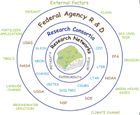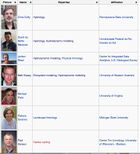Difference between revisions of "Main Page"
(→Contributing to this project) |
(→Contributing to this project) |
||
| Line 19: | Line 19: | ||
<b>[[Contributors | There is a growing set of contributors to the project]].</b> | <b>[[Contributors | There is a growing set of contributors to the project]].</b> | ||
| − | + | We are approaching this work with a new framework for collaboration that we call <b>Organic Data Science</b>. [http://www.organicdatascience.org See this site for more information about this framework]. | |
| − | + | The contents of this wiki are accessible to everyone. If you would like to contribute new content, please contact us to obtain an account by emailing us at <b>organic.data.science@gmail.com.</b> | |
= Acknowledgments = | = Acknowledgments = | ||
This work is supported by the National Science Foundation through the INSPIRE program with grant number IIS-1344272. | This work is supported by the National Science Foundation through the INSPIRE program with grant number IIS-1344272. | ||
Revision as of 22:17, 20 October 2014
Contents
Our Science Goal: The Age of Water and Carbon
This study focuses on long-standing problems of coupled water and carbon budgets through development of a new scientific paradigm, The Age of Water and Carbon, that melds theory and practice from limnology and hydrology within the new collaborative paradigm of Organic Data Science. We are integrating analytical frameworks from two communities – hydrology and isotope modeling in Critical Zone Observatories (CZOs) and hydrodynamic water quality modeling from the Global Lake Ecological Observatory Network (GLEON) – to quantify water and material fluxes from two research sites, the Shales Hills CZO and the GLEON member site, North Temperate Lakes LTER. This foundation will serve as a nexus for participation by multiple communities and will seed the growth of additional science through shared ideas, knowledge, and data.
Ongoing Science Activities
Our project goal is to predict pathways and age of water and carbon isotopes for lake-catchment systems. To that end, we are working with the community in several major activities:
- Develop a computational model for water and carbon isotopes in lake-catchment systems
- Select core lake and catchment models
- Implement the catchment model for North Temperate Lakes
- Implement the lake model for North Temperate Lakes
- Couple the lake and catchment models
Contributing to this project
There is a growing set of contributors to the project.
We are approaching this work with a new framework for collaboration that we call Organic Data Science. See this site for more information about this framework.
The contents of this wiki are accessible to everyone. If you would like to contribute new content, please contact us to obtain an account by emailing us at organic.data.science@gmail.com.
Acknowledgments
This work is supported by the National Science Foundation through the INSPIRE program with grant number IIS-1344272.

